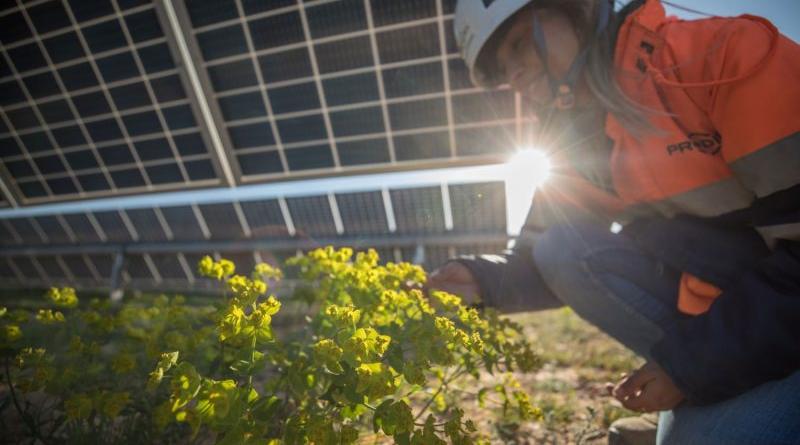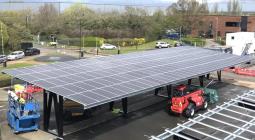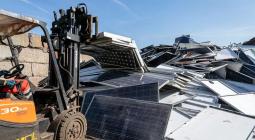A net zero industry act fit for net zero: let’s shine a light on solar

The EU needs to deploy renewable energy as fast as possible to replace fossil fuels and meet its ambitious climate target. As RepowerEU states, a massive scaling-up of renewables will accelerate EU independence from Russian gas, give a boost to the green transition, and reduce electricity prices over time. Solar is the driving force in this process, it is the fastest growing form of electricity generation across the continent. Last year Europe installed 41.4GW of solar, and it is supposed to bring online over 320GW by 2025 and almost 600GW by 2030. These numbers show the magnitude of the challenge we are facing: to achieve our goals, we must maintain and even accelerate this momentum. We must enable solar to soar.
Francisco Beirão is Head of Government Affairs for Europe Lightsource bp.
The proposed Net Zero Industry Act (NZIA) can and must support this acceleration. Unfortunately, and despite its best intentions, the proposal risks raising new market barriers and slowing down the deployment of solar.
Europe needs to accelerate the rollout of solar, not slow it down
As a global leader of the climate transition, Europe needs the affordable and sustainable solar modules only a global supply chain can deliver. And we need this effective global solar supply chain as well if we are serious about phasing out Russian gas as quickly as possible. Building up a new manufacturing value chain in Europe, as proposed in the NZIA, takes years. But the proposal does not mention this. And we do not have the time. We urgently need to remove bottlenecks, not create new ones.
Efforts to bring solar manufacturing back to Europe are often linked to the creation of new jobs. However, the NZIA is unlikely to result in a competitive European solar manufacturing industry in the required timescale and will bring renewables back to a subsidy era. Moreover, when it comes to the solar value chain, jobs in Europe are mostly created with deployment, not manufacturing. According to SolarPower Europe, the great majority of solar jobs are associated with deployment activities (80%). Delivering on the EU’s 2030 renewable energy target can create over 500.000 jobs in deployment related activities. In contrast to that, meeting the 30GW solar manufacturing target in Europe would potentially only create 50.000 jobs – while many jobs in deployment would be lost due to the slowdown in new solar projects. We would end up subsidizing selected companies from just a few Member States without creating a significant number of jobs.
The current NZIA risks ending the era of affordable solar
The proposed NZIA will increase bureaucratic procedures and add new red tape, further slowing down tender procedures. At the same time, its provisions do not ensure the long-term competitiveness of European solar manufacturing. This is a potentially fatal combination. The current proposal threatens investors’ much needed unrestricted access to global competitive supply chains. BloombergNEF, based on data reported and interviews with companies investing in manufacturing, illustrated the challenge by showing that each 1GW of solar module value chain (polysilicon to module) installed in Europe will cost the economy three times more than existing supply chains.
McKinsey estimates that, in the long-term, if an EU module value chain is operated at maximum operational efficiency, at scale and across the full value chain, manufacturing solar-PV in Europe would increase costs by 20-25%.
Co-legislators should take on board three key considerations to make the NZIA work for the Green Deal and for solar power: First of all, it is of the upmost importance to accelerate the pace of deployment. The EU should keep market access open to all and move the ‘resilience’ criteria out of the rules to participate in auctions for solar contracts for difference (CfDs). Policymakers should prioritise access to competitive solar supply chains while promoting their diversification. Instead, the NZIA would raise barriers to market access by introducing ‘resilience’ criteria to public procurement procedures and auctions. A diversified supply chain has value if it is market-based. Therefore, the 65% ‘resilience’ threshold should be moved out of Chapter 4.
Secondly, given the commodity nature of electricity and competition between technologies, market access provisions must deliver affordable and competitive solar solutions. Price-based solar auctions achieve competitive prices for consumers and industry. Adding non-price criteria would not only result in developers having to bid at higher prices, but it would also render these procedures more bureaucratic and time consuming. Non-price criteria in Articles 19 and 20 must remain strictly voluntary – in line with current state aid guidelines – and must not exceed 30% in weighting. Furthermore, these criteria need to be harmonised and uniformly implemented to preserve the integrity of the single market.
Lastly, the 10% cost safeguard included in the NZIA must remain in place and become mandatory. While a definition on how to calculate the 10% is required to avoid harming the EU’s energy and climate goals, this cost safeguard is of upmost importance. It will help ensuring a cost-effective energy transition and the competitiveness of the European economy. Let’s be very clear: Every additional percentage point means higher cost for households and businesses.
Co-legislators have to pay more attention to the NZIA’s market access provisions
Discussions in the EP so far have treated market access as an afterthought. But we need a serious discussion on the proposed non-price criteria. Among national governments, this issue seems to be more readily discussed. Policymakers need to come up with workable policy positions and at Lightsource bp, we stand ready to support this process.
Europe needs to choose solar
We know that deploying renewables is the only solution to avoid another energy crisis and unbearable electricity bills for customers and businesses. Solar installations will need to surge in the next years if we are to achieve this goal. Europe has worked very hard to be where it is today – It would be detrimental to our own decarbonisation and security objectives if the NZIA’s market access provisions roll back all the gains of recent years.





